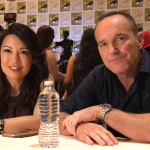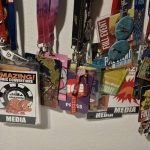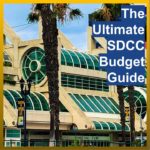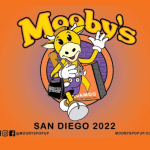Supersonic: TV’s Top Composers at SDCC 2022
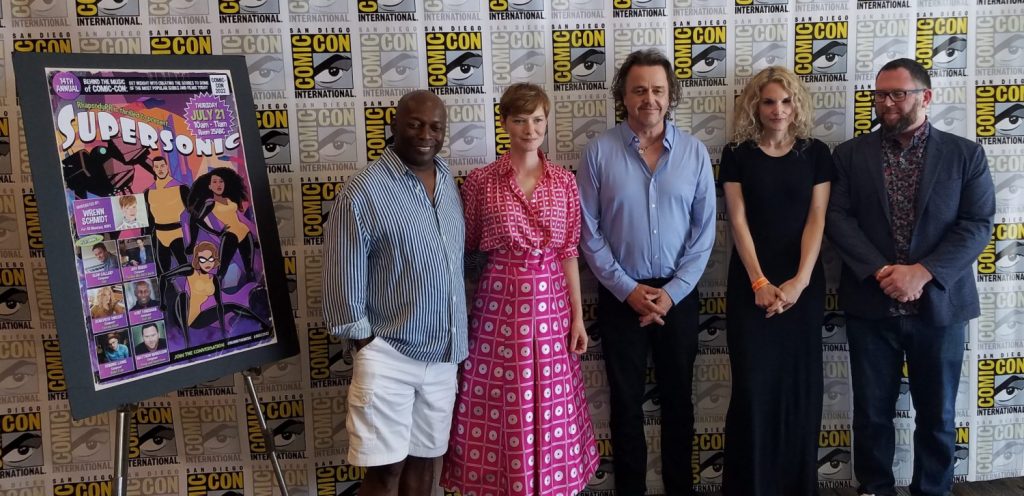
One of the things that separate San Diego Comic-Con from other similar conventions is its sheer scale and variety. A lot of the focus at SDCC is on the big-name guests and the popular panels. Saturday in Hall H has become infamous for the time commitment necessary to get a seat in the room, because it’s well-known that Saturday is the day the major studios bring their blockbuster talent. But SDCC is more than just A-list actors and world premiere trailers amid a sea of screaming fans. SDCC is also about the low-key moments, the quiet panels where you get to sit and listen to experts talk about their craft. For example, the “Supersonic” panel, which featured four TV and film composers discussing their processes and inspirations.
I got to sit down with all four featured composers – Genevieve Vincent (Fantasy Island, Gutsy), Sean Callery (Jessica Jones, Halo), Kurt Farquhar (The Proud Family, First Kill), and Matthew Margeson (Kingsman: The Secret Service, Young Jedi Adventures) and pick their brains a little more.
Genevieve Vincent
On working on the upcoming Gutsy (based on Hillary and Chelsea Clinton’s The Book of Gutsy Women): “I was, you know, really hoping 2016 was gonna go differently. But I actually worked in a call center for Hillary’s campaign, when I could. I obviously was working and stuff, but when that was happening, I was popping out to do a few hours here and there to make calls. So yeah, I mean, just being able to, I think, helping her have that positive influence is huge. […]
“And the women in the show, I guess, I can’t say anything about it specifically, probably, but the women in the show are a mix of women that you have heard of, but also tons of women that I was like, I am so glad they’re getting this moment. Because they are doing amazing work in so many different vocations. And finally, they’re getting a little bit of a spotlight. So that’s all super positive.”
On the director’s vision, television vs. film: “So on a show, it’s a little bit different. So like, for Fantasy Island, or for What Happened, Brittany Murphy?, it’s the directors who are weighing in, but also studios and the showrunners, and that sort of thing. And so you’re taking in a lot of different ideas. And you’re sort of filtering them down and going like, ‘Okay, I think musically, this is the answer.’
“But with a film, you know, the directors have a really specific vision. And it’s like they’ve spent years sometimes making that vision happen. And so for me, I think of myself more as a translator of their vision, musically. And so I’m just trying to get to the truth. I think that’s the most important thing for me when it comes to film scoring, is getting to the truth of it.
“It’s sort of like, what is this really, musically, this movie? And then usually we are in concert because you know, that’s what they want, too. They want the thing that is unique and speaks only to what they’ve created, as much as possible.”
On paying homage to the original Fantasy Island when composing for the reboot: “When I first started pitching for the job, I watched all of [the original series]. And that was really important to me, to be able to really understand where it was coming from originally. That being said, you know, this reboot is so updated, and it’s so different in awesome ways, so it influenced me in being able to kind of respect it, but it didn’t really influence me that much in terms of the sound. The sound needed to just be new.
“However, the original theme finds its way throughout the score. So it’s in the main title theme, which I sang. […] And then it sort of – every time we’re on the island, we’re having an island moment, we’re fulfilling a fantasy or Roark is, you know, having a Roark conversation with someone about their fantasy or having a Roark moment… There’s these moments where you need to refer back to that theme, to kind of ground you in that Fantasy Island world. So I yeah, I bring it back as a light motif from time to time for the island, I would say.”
On being inspired by the subtle acting choices: “I feel like I enjoy ruminating on good moments of an episode that I’m like, ‘Oh, the actor really brought something different’ or something like another layer to that, that I didn’t know was there when I was just reading a script. So I try to comment on those things, musically, and bring them out. You know, bring out the special little things.”
On what makes a score uniquely her: “I think it’s personality. I think there’s a quirkiness to my music that is there, whether or not I want it to be there. And I think the subtlety is there, you know, in all of it. Little intricacies are something that I focus on. I’m very melodic in how I write, probably because I’m a singer. So I’m always coming from the perspective of the big idea of like, the melody, and how that feels over something.
“But I’m pretty versatile. And I think that makes it a little bit trickier to kind of like nail it down, I guess. I guess it’s sort of like, well, if you take a genre and you put it in your own vernacular, doesn’t matter what genre it is, it’s gonna sound like you.”
–
Sean Callery
On composing after Covid: “The composer’s life… the before COVID, during COVID, and after COVID, has sort of been unchanged. We spent a lot of time alone. The one thing that was really profoundly different, as I left the studio, was pretty much still alone. And that was different for everybody. So, we had a lot of isolation in our job.
“But then one thing that was really foreign to me was the isolation and when you’re not in the studio. So, that did have an effect on me from the point of view of my family. […] One of my wife’s parents passed away and she had to be with them for a while. So for a good two, three months I was living alone and working alone.”
On often choosing a particular word as a theme to focus on: “You know, in the case of Jack Bauer, for example, when I was talking with the executive producer about that, the one who hated the clarinet, you know, he described him as a hero. He definitely was a hero, but he also could be rogue. He could be kind of a maverick, and kind of do things off book. So, rogue hero, [a hero that] doesn’t play exactly by the rules, but has a good moral center.
“[…] So, sometimes I just try to, like, if I can take a pill with that word, and just sort of kind of let it marinate and then see what happens. Sometimes things come out in that way.
“And in the case of [Jessica Jones], and Halo, that process serves me well, in terms of finding a theme. Because it becomes specific. I think the thing we love about the best things we’ve ever heard… First of all, they’re catchy. But there’s a specificity to them.”
On that one producer who hated clarinets: “In the end, you really appreciate that kind of clarity. When someone says, ‘I really don’t like this’ of any kind, that’s as good as them telling they love something in a way. I mean, it’s not as good. But when someone is really clear about something they’re not connecting with, then you know that you can retire that as a sound or a direction.
“By the way, to add to that story, I’d played back a couple of things. And I had already recorded the score. And we were playing back the first two or three cues. And he goes […], “Lose that sound. I hate that sound.” I said, okay. So I’m not using a clarinet again. And I had three more cues that used the clarinet.”
On composing for the Paramount+ Halo series: “There has to be an authenticity to what you’re doing. You have to be connected to what you’re doing. […] If I reused a pre-existing Halo theme on something that I wasn’t quite connected with in terms of the story, I don’t think it works. And I think any fan, no musical experience whatsoever, will start to fade from the connection to the show as well.
“I believe a good composer, whoever is doing this, I think they bake into the music that kind of connection that they have to what they’re doing. And the more connected you are to something, I believe you bring a specificity to your approach. So if I use the Halo theme on my theme, John’s theme, we pick those moments so that when they arrive it feels earned.”
–
Kurt Farquhar
On getting the right vibe for First Kill: “Well, a big element of our sound with the First Kill is the use of voices. And we use them in varied ways. A lot of times they’re very obviously, that’s voices. But some of the voices are changed so much.
So for example, one of the singers had come to the session early. And I said, ‘Hey, I want to show you what you did last week’ And she was like, ‘Where am I at?’ I said, ‘That’s you.’ And she’s like, […] ‘Still don’t get it.’ And I say, ‘Okay, let’s take all the effects off.’ And she’s like, ‘Oh, that’s exactly what I sang!.’
And that’s how much we’ve changed it. There’s some things that you’re going to think, clearly are a synthesizer, or something like that. But it just has a different feel to it. And it’s really someone’s voice. And sometimes we mix things that don’t sound like a voice with the actual voices. […] That’s a big portion of where the sound of a First Kill comes from.”
On figuring out the tone of a score: “Sometimes a producer comes in and has an idea of what they want. Sometimes it’s me picking at their brain and saying, ‘Hey, what were you feeling? What were you thinking?’ Because let’s face it, I’m a cog in the wheel. This is a person that’s hung with the story for either months or years, in some cases, and I come in at the last minute. I can’t be all-knowing all-seeing Kurt, you know?
Sometimes it’s about what were you listening to when you wrote this? What would you do if you had Steven Spielberg’s budget, you know? Or God’s? No, probably I prefer Stevens. [laughs]
But, you know… open up their thinking and open up a dialogue, a conversation about what they’re feeling and what they’re trying to feel and why and how. And then resting on all of the things that, you know, there’s things that […] every musician does, that not everybody knows that they do, you know. There’s things that they’re interested in that not everybody knows that they’re interested in.”
On what attracts him to a project: “You know, the great fortune of having been around for a second and been able to do a lot of different projects is to be on the hunt for stories that you haven’t done. And be on the hunt for somebody that just really is trying to push the envelope and trying to be different for the sake of telling the story in a different way… in a more interesting way.
And I’m very excited about being able to tell stories from an extreme point of view that we may not have always seen, in ways that we may not have always seen. That’s very exciting to me. And I’m intrigued every chance that I get to do something where it’s allowing me to be my authentic self, musically. I believe that helps me become a more useful part of their story or of their story-making process.”
On why he wants to score an A-list Marvel film: “I want to do a character that no one would expect me to be doing. I always used to say Iron Man. That was the one that I wanted to do. But really I want to do something new, that nobody would expect. They would not see it coming that they would have chosen me. Much like First Kill.
I encourage people to get the soundtrack. Check that out and see what was actually done there. It is a truly, truly unique score. If they allow me the opportunity to do an A-list Marvel feature, I will change the face of how scoring is done or I will pay for them to go get somebody else. Seriously, I will give them the money back and pay them the going rate for whatever composure that they need to go and do the same old stuff again. I will change the face of how music is perceived for this particular genre if they allowed me to do even one of those.”
–
Matthew Margeson
On having to compose without much information on the project: “When I first started demoing for the [Young Jedi Adventures], I was basically given, like, a paragraph of a synopsis of a portion of a scene. And it’s like, ‘This is what might be happening. Try to try to come up with something.’ But other than that, I mean, I really know nothing about this story. I know nothing. […]
It’s so funny, because I have a nephew who’s back on the East Coast who is a huge Star Wars fan. I mean, knows all of the expanded universes and watched all the shows, read all the graphic novels, and everything. And I’m calling and he, like, knows more about the show than I do at this point. But yeah, I’m super excited to see what it is.
What I do know is that it’s the first time they’ve dived into material that is specifically for, like, three- to five-, seven-year-olds, you know. So I imagine there’s going to be kind of a delicacy in the lessons that are taught and like the real kind of stripped down lessons that you would teach three-year-olds, I would imagine, at this point.”
On the shift from action movies to family-friendly projects: “My world pre-COVID was very much GI Joe and Kingsman and Pirates and doing these things that are like high-octane action, adult visceral music for these types of films. And then COVID happened. And I moved my studio home, because of the obvious reasons. And I knocked down my garage and built a studio there to write out of instead of the studio that I was going into every day for the past 15 years.
“And this odd thing happened – it wasn’t something that we purposefully did. But these calls started coming in for more kid-friendly family films, and I started demoing for these things and started getting them. And it was this shift – like I said wasn’t intentional. And I have to say that it’s a whole different world for me
“A lot of the times, these kind of adult action films, the music is, like, how cool is it? How visceral is it? It’s almost like making a record where a lot of the stuff is right at the front of the speaker, and it’s very aggressive and abrasive. And you need to be cool. And you need to, like, how much more aggressive can it be, you know?
“And with these kids films, it’s all about just like melody, and tune and working out the harmonies. And it’s a whole different world for me, and I have to say that I couldn’t be enjoying it more.”
On finding ways to make his tracks unique: “I always thought it’d be fun to put kazoos in, and I put in some kazoos in [Alice’s Wonderland Bakery]. There was one moment in, I think, one of the first or second episodes which was like a ta-dah moment. And literally, the music goes, ‘TA-DAH’. And at first, I did that with just kazoos, and they were like, ‘It’s a bit kazoo-y.’ And so I think I actually just doubled it with brass, so it would just not make it sound as [kazoo-y].
“I always find it kind of cool to take other things, like a car horn or something, and stretch it out to be five minutes long […]. That’s always fun for me, as far as like experimenting with things that are not necessarily Western orchestra. I’ll take a knock on the table and put that through 20-minute reverbs and all of a sudden I’ve got this ambiance which no one else has that in the world but me because I recorded the knock.”
On figuring out the tone of a project: “You can get so much from a script. You could read a script and be like, ‘Oh, I know, I can picture this, it’s gonna be like Drive.’ Or I can picture it’s gonna be, like, you know, some other shows just tonally in the cut. But then once you see it, you could have been completely off base.
Or, you know, like, the script is also just a roadmap that they go into shooting with. And so a lot of the time, there are detours, and they’ve got to take the detour. […]
The first time you watch the film, assuming we’re talking about a film, it’s the only time you get to watch it for the first time. So that impression of like the color scheme, how fast is the edits? How grainy does it look? How did the blacks look on the screen? How sharp is everything?
I try to kind of, like, go into it consciously knowing this is the first time and the only time I can watch it for the first time. So let’s be really conscious of my impression and how I’m feeling, you know. So that definitely would influence tonally what I do musically.”
——-
Stay tuned for more from SDCC 2022!
Author: Jamie Sugah
Jamie has a BA in English with a focus in creative writing from The Ohio State University. She self-published her first novel, The Perils of Long Hair on a Windy Day, which is available through Amazon. She is currently an archivist and lives in New York City with her demon ninja vampire cat. She covers television, books, movies, anime, and conventions in the NYC area.
Help support independent journalism. Subscribe to our Patreon.
Copyright © The Geekiary
Do not copy our content in whole to other websites. If you are reading this anywhere besides TheGeekiary.com, it has been stolen.Read our


